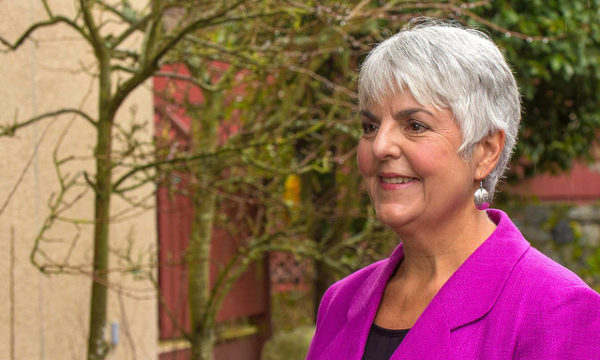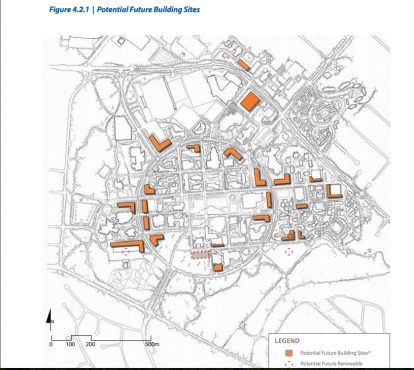UVSS happy about the plans after months of lobbying
Despite the unseasonably cold temperatures chilling the province, the B.C. NDP government warmed up to post-secondary institutions in their 2018 budget announcement.
After months of lobbying the government, universities and student unions across the province got their wish: a budget that allocates $450 million to a new student housing program that will allow public post-secondary institutions to borrow from government to finance student housing projects.

B.C. Finance Minister Carole James delivered the B.C. NDP’s 2018 budget yesterday. Photo from B.C. NDP via Flickr
“We’ve been lobbying with the UBC Alma Mater Society, as well as the Simon Fraser Student Society and the Alliance of B.C. Students for these debt restrictions to be lifted so post-secondary institutions can build more on-campus housing,” said Anmol Swaich, UVSS Director of campaigns and community relations.
“Honestly, we’re super pumped that they’ve taken a move in the right direction. This is going to probably benefit both students and the housing market in general,” she said.
Previously, universities were unable to acquire provincial funding for housing due to fears that loans would negatively affect the province’s credit rating.
However, the new B.C. NDP government plans on removing that old notion as part of their 30-point plan to tackle the housing affordability crisis. Objective number 17 of the new budget lists “working with universities, institutes, and colleges to build new student housing” as one of the provincial government’s housing priorities.
Specifically, the B.C. NDP plans on partnering with post-secondary institutions to deliver at least 5 000 new beds for student housing. Institutions will be able to borrow directly from the allocated $450 million to finance student housing projects.
“These new on-campus homes will help more students find an affordable place to live while they pursue their studies,” the budget report writes. “And as they move closer to their studies they will free up rental housing in tight rental markets, making it easier for everyone to find homes.”
This news comes in the wake of a November 2017 Vancouver Island Public Research Group study, which found that 70 per cent of post-secondary students reported their income places them under the national low-income, or ‘poverty line.’
The budget announcement comes as UVic continues to increase its on-campus housing resources. On Feb. 15, the university announced plans to build a new residence facility that could house up to 600 students, which would bring the total number of spaces on residence to 2 900.
Kristi Simpson, associate vice-president financial planning and operations at UVic, said the announcement will help UVic stick to its housing commitments.
“One of the number one capital priorities has been an expansion of student residence by 600 beds, so this is really welcome news to us because it will allow us to continue planning for that,” Simpson said.
“Both the University of Victoria and most of the post-secondary institutions have been working with the provincial government for the last couple years to raise the profile for the need around student housing,” said Simpson, “so we’re really happy to see that it’s being acknowledged.”
Budget offers more than just housing
There are plenty of other policies in the budget that concern students. The B.C. NDP announced the elimination of MSP premiums by 2020, the introduction of a child care benefit that could save families up to $1250 a month per child, and the freezing of BC Ferry fares on the Tsawassen–Swartz Bay route.

A map of the potential building sites for UVic’s new residence building, announced on Sept 11. Photo via UVic Campus Plan
Moving forward, UVSS director Swaich says the next step is making sure UVic students have the same stringent tenancy rights that anybody living off campus has.
Students living on campus aren’t covered under the RTA, which can lead to tenancy issues.
Specifically, Swaich points to uncapped residence fee raises and the fact that on-campus students are forced to move out one day after their last exam as concerns. If residents had a provincially mandated tenancy agreement, Swaich explained, they might not be subjected to such pressures.
“I think here at UVic, students are forced to move out the day after their last exam,” she said. “So, then it’s like are you studying for that exam? Or are you packing?”
As a result of these pledges, the province’s total debt this year is expected to rise by $4.1 billion to a total of $69.4 billion, the largest one-year jump since 2012/13.
Consultations for UVic’s new residence building are ongoing. An on-campus open house will be hosted on Thursday, March 8, from 11 a.m.–2 p.m. in the University Centre lobby. Community members can offer input on Saturday, March 10, from 1–4 p.m. at the Gordon Head Recreation Centre auditorium.






